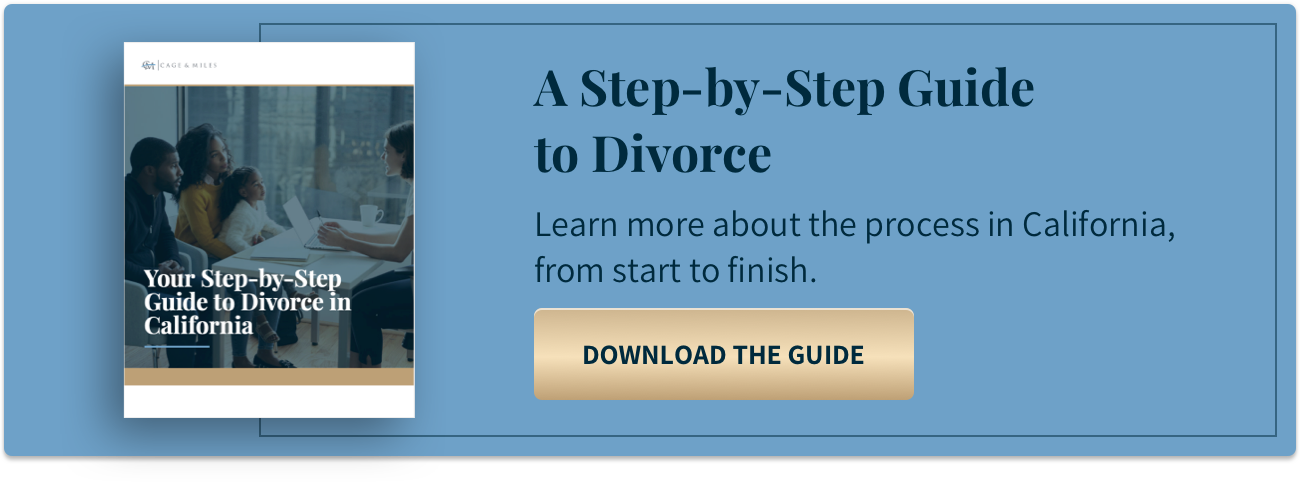- Law Practice Areas
- Resources For You
- Child Support Calculator
- Take Our Divorce Quiz
- Protect Your Assets and Net Worth During Divorce
- Blog
- Family Law Videos
- Your Guide to California Divorce
- Your Guide to Child Custody & Support
- Everything You Need to Know About Getting a Prenup
- An In-Depth Look at Divorce Mediation
- Top Considerations for High Asset Divorce
- Our Legal Team
- Locations
- Reviews
- Contact

A high-conflict and/or complex divorce matter can be, as they say, “messy.” This can apply to the conflict between the parties regarding custody of minor children and the accusations that are being made against each parent, or it can apply to the characterization and division of property.
It can also apply to the disputes over other matters such as child support, spousal support, and allegations of mismanagement of community property. High-conflict can mean there are allegations of neglect, abuse, or substance abuse in the custody context. It can also mean the parties are, for various reasons or causes, unable to see eye to eye and have vastly different communication styles, parenting styles, or personalities that interfere with the marital bond.
High-conflict can exist in regard to parties attempting to run a business together as well, where the normal daily operations of a business are being affected by the personal disagreements of the parties or one party’s violations of disclosure requirements, fiduciary duties, and/or management and control of the business.
In Los Angeles, high-profile litigants may want to keep the divorce as low profile and private as possible. Thus, keeping the “messy” details out of the public sphere. Celebrities and athletes are not the only ones with privacy needs, as a high-conflict divorce can affect businesses, too; trade secrets, client lists, patents, internal company matters, and management can become fodder for business rivals to use.
Some allegations could have detrimental effects on a businessperson’s reputation, which, in turn, affects the valuation and future prospects of a business that are tied to that person’s persona, business reputation, skills, experience, or “brand.”
Litigation over the development of a proprietary product could reveal critical information that benefits neither party nor the business they are fighting over, should that information be useful to their business rivals or has the potential to worry key shareholders or clients. In these situations, the parties may want to opt for private mediation and/or litigation with a private judicial officer. This is usually accomplished by an agreement between the parties to hire a retired Family Law Judge or Commissioner to be appointed to their case for one or all matters.

This can limit the amount of information that is out in the public eye. The parties can also agree to what are known as protective orders, which define what information is confidential and who shall have access to possess it, review it, and place restrictions on how it is shared with others.
However, since all divorces are considered matters of public interest, parties cannot simply ask the “regular” courts to seal files or records (even those being filed in relation to motions and other proceedings before a private judge). There are very specific rules, statutes, and case law precedents governing the public nature of divorce filings. Skilled and experienced family law attorneys know how to limit what goes into the public filings or what occurs in public proceedings.
What Is Litigation in Divorce?
High-conflict means a lot of litigation. Litigation is the general term encompassing the role of attorneys and possibly other experts such as forensic accountants, who are engaging with one another on behalf of their clients, as well as the process of filing requests for orders or other motions in the court for which there can be multiple hearings and even trials, consisting of anywhere from a partial day to multiple days over weeks or even months.
A contested divorce in California likely will involve litigation. Litigation is a formal court process. It can involve attorneys or no attorneys, but generally applies to the filing for orders with the Court, known as requests for orders or motions, to resolve disputes the parties are unable to reach agreement on outside of Court.
How Much Does a High-Conflict Divorce Cost?
A contested divorce in California can be very expensive. First, there are the fees for filing, the fees for court reporters, and the fees for transcripts of proceedings. There are the costs associated with hiring experts such as forensic accountants, vocational examiners, independent medical examiners, child custody evaluators, therapists, consultants, private investigators, supervised visitation monitors, even attorneys appointed for the children (Minor’s Counsel).
Litigation incorporates the process of formal discovery, which is a formal process of requesting and exchanging information, documents, or obtaining testimony (such as via deposition). Discovery alone can increase costs by thousands of dollars, depending on the issues and complexity of the issues.

Costs increase also based on the tactics employed by parties and attorneys to cause delays or avoid full disclosure of information to the other side. It is a frequently asked question as to how many divorces go to trial. There is some data that suggests that only about 5% of divorce cases end up going through the litigation process. With the right mind-set, guidance, and advice, disputes can be resolved out of court amicably—and with far less expense.
Various internet sources claim that the average cost of divorce in Los Angeles is approximately $17,500, including the initial filing fee of $435. This is likely unrealistic given that if litigation commences, both parties are likely retaining (hiring) attorneys with a minimum $10,000 retainer, although some high-profile firms require as much as $25,000 to $50,000 upfront, given the issues, assets, and complexity of the work involved.
Attorney hourly rates in Los Angeles range from $250 per hour to as much as $1000 per hour, and some firms will assign a partner and several associates to the case, with not less than one partner and one associate attending all hearings. Forensic accountants are going to be required for any business valuation, to assist with tracing (a form of tracking and analyzing separate property used/spent during the marriage), and to determine income for self-employed, non-W-2 earners or parties with multiple forms of income and or extensive assets.
A forensic accounting firm is likely to cost $10,000 to $15,000 for the initial retainer, but the fees for the work can increase to $20,000 to $40,000. For this reason, litigation of a divorce case in Los Angeles can cost as much as $30,000 to $50,000 for an estate of even fairly “modest” means (house, retirement, some accounts, vehicles, etc.) to as much as $100,000 to $1 million for estates involving more complex assets such as self-owned businesses, law practices, medical or dental practices, a patent or specialty product created during the marriage, or division of stock options/Restricted Stock Units (“RSUs”).
Frank and Jamie McCourt, the former owners of the Los Angeles Dodgers, had an extremely high-profile, high-conflict divorce where it was reported that they incurred $19 million in attorneys and accounting fees.
What Litigation Can Mean for Your Los Angeles Divorce
It is difficult to provide an exact California divorce timeline, as many factors affect the movement of a case through the court system to resolution (final Judgment of Dissolution of Marriage). There is the court’s calendar and caseload, the issues and conflict between the parties, the amount of information the parties need from one another, and the ease by which that information is provided or obtained.
On average, litigated divorces can take a year or more to finalize. A contested divorce that goes all the way to trial can last up to 30 days depending on the assets, the claims of the parties, and the number of witnesses involved.

A recent case involving a contested premarital agreement did in fact take months to conclude, even with the parties using the convenience of a private judge and private court to schedule the trial dates “Regular” litigation in the open court system does not generally permit the parties or attorneys to be in control of the days and times of the trial (with some allowances and flexibility for good cause such as religious observances or required medical treatment, etc.).
Most court proceedings are also open to the public, with some exceptions for cases involving child abuse allegations or certain other cases involving sensitive topics or witnesses, such as children. In addition to the financial cost of litigation there is the emotional cost. There can be fall-out amongst family and friends as they might be called upon as witnesses and “collateral damage” which often refers to the effect of the conflict on the children.
Parties are absolutely not supposed to discuss or involve their children in litigation and divorce conflict. Sometimes court orders are made to ensure this does not occur. Even if no one is talking about it around the children, most judges will tell parties that they can be assured their children sense the conflict between the parents, and the emotional state of the parents without a doubt influences their children.
Mediation May Offer the Amicable Resolution You Are Looking For
It is possible to divorce amicably using mediation. This process allows both spouses to save resources and energy for their start anew as separated individuals, preserve assets for retirement or the children’s college/inheritance, and limit the emotional fall-out that comes with high-conflict litigation.
Divorce mediation is an Alternative Dispute Resolution (ADR) process used by couples to confidentially resolve conflict outside of the traditional family law courts. The goal is to find a mutually beneficial divorce agreement. A couple meets with a neutral, third-party mediator or group of mediators.
The mediator’s role is not to give legal advice to either side, but they do provide information and assist in tasks for both parties that are “neutral.” The mediator will meet with both parties to assess what their goals are for the resolution of their divorce. The mediator will have the parties prepare and provide one another with information about their income, assets, and debts.
Mediation will often include discussions as to how to divide the property and debts. A mediator will also assist the parties with a custody agreement if they have minor children. During the process of mediation, which is considered confidential and privileged, the parties may consider various options, or they may not agree, and the mediator works with them to get to a place of agreement.
The mediator will assist them with the binding terms that will be incorporated into the final agreement, known as the Judgment of Dissolution of Marriage. When the parties have the right mindset and attitude about mediation, the use of a mediator can facilitate communication and dispel confusion and mistrust.
The mediation process is usually faster than litigation and more cost-effective. Mediated divorces can sometimes be resolved in 2-3 sessions, over several weeks to several months. A mediator can still provide legal information such as how child support is calculated or how to value a deferred compensation plan, but that advice will be mostly neutral and for purposes of informing the parties, not necessarily advising either of them on their best interests.
Often, compromise is hard. Sometimes there is no clear-cut way to divide the assets straight down the middle or 50-50, or the parties may believe that there is a possibility to get a better “deal” from the judge. Some parties may feel they had to give up something they are entitled to under the law, such as a separate property reimbursement or more spousal support to reach a negotiated settlement, but in the end, the cost-benefit of a mediated agreement outweighed the desire to proceed to court with all its attendant costs and unknown outcomes.

Mediation is an option and an opportunity for parties to a divorce to utilize a third party neutral to assist them: either alone as self-represented parties or in connection with representation by independent counsel for each party. Self-represented parties typically go into mediation with an idea of what they already want to agree to or accomplish and just need a neutral party to assist them with drafting paperwork and filing it with the Court.
When the issues are more complex, parties generally should have attorneys to put the parties in the best position to negotiate a positive or satisfactory settlement in mediation. A strong mediator with a knowledge of family law can assist many high-conflict cases with reaching resolution when all parties come prepared and commitment to the process.
A party who comes highly informed and prepared, with prepared reports if needed by forensic accountants, and who looks ready for Trial, is going to be more successful than the party who is not as prepared. This is why having skilled and experienced counsel is often critical even in mediation.
Tips to Keep Your Los Angeles Divorce As Amicable As Possible
- Focus on Communication: Having open and effective communication can limit conflict, stress, and the possibility of a protracted divorce trial. If arguments are unavoidable, one can strive to limit contact and engage only when necessary. Likely the number one factor that will keep a divorce as amicable as possible is maintaining civility and learning to communicate or have professionals communicate on your behalf in a manner intended to encourage cooperation and civility from the other side.
- Keep It Private & Rely on the Experts: The parties should avoid social media and avoid involving too many third parties in the details of their divorce. This is especially true when it comes to taking advice from non-family law attorneys. Do not rely on your friends’ and family’s anecdotal tales of their divorce or someone else’s divorce for comparison.
- Minimize Exposing Children to Litigation: Divorce litigants should avoid involving the children at all costs. It is best to remember that you always control your reactions and your own conduct even when dealing with a spouse who refuses to negotiate and may be completely unreasonable. The best practice is to work with an empathetic family law team.
- Consider the Help of a Mental Health Professional: Some parties benefit from engaging in therapy specifically for learning to communicate better and co-parent their children without conflict. Some couples benefit from therapy geared toward assisting them with closure as to the relationship itself.
You Can Find an Amicable Resolution for Your Los Angeles Divorce
Not all divorces end with litigation. There are many ways Los Angeles divorce litigants can benefit from mediation instead of litigation. Cage & Miles has an experienced team of skilled attorneys with the ability to guide you through this difficult process.
With the right team on your side, you can avoid a high-conflict divorce and limit the publicly available details of the divorce. Having skilled attorneys in your corner can also assist you with being informed and prepared to enter mediation with the highest chances of success, while also being trial ready.




